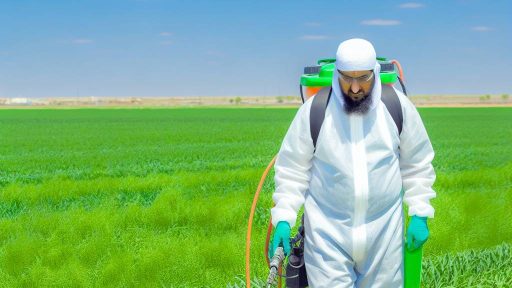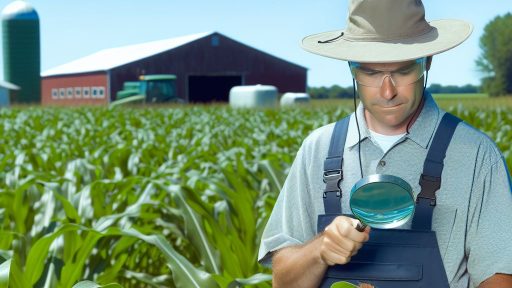Introduction to Chemical Use Compliance in Agriculture
Chemical use compliance is crucial for modern agriculture.
This process ensures that farmers adhere to regulations.
Compliance helps protect the environment and public health.
It also supports sustainable farming practices.
The Importance of Compliance
Farmers must understand the significance of compliance.
Non-compliance can lead to legal repercussions.
This includes fines and potential loss of farming licenses.
Moreover, compliance enhances consumer trust.
Consequently, it fosters a responsible farming image.
Understanding Applicable Regulations
Various regulations govern chemical use on farms.
These include federal, state, and local laws.
The Environmental Protection Agency (EPA) plays a key role.
State agricultural departments also enforce regulations.
Farmers must stay informed about these laws.
Practical Steps for Compliance
Adopting best practices can ensure compliance.
Transform Your Agribusiness
Unlock your farm's potential with expert advice tailored to your needs. Get actionable steps that drive real results.
Get Started- Keep detailed records of chemical applications.
- Educate staff on regulatory requirements.
- Utilize certified training programs.
- Regularly review and update practices.
Additionally, farmers should seek guidance from experts.
Collaboration with local agricultural extensions can be beneficial.
Challenges in Compliance
Several challenges exist when aiming for compliance.
Many farmers face difficulties understanding complex regulations.
Moreover, staying updated can be overwhelming.
Seasonal changes can affect compliance efforts.
Thus, continuous education is essential.
The Role of Technology
Technology improves compliance tracking and enforcement.
Software tools can streamline record-keeping.
GPS technology enhances precision in chemical application.
Moreover, remote monitoring systems can aid compliance.
Utilizing technology minimizes human error.
Contributions to Sustainable Agriculture
Understanding chemical use compliance is essential for farmers.
This knowledge protects the environment and supports public health.
Adopting best practices can simplify compliance efforts.
Farmers must remain vigilant and proactive in addressing challenges.
Ultimately, compliance contributes to sustainable agriculture.
Understanding Regulatory Frameworks
Local Guidelines
Local regulations govern chemical use on farms at the community level.
These rules can vary significantly between different regions.
They often address specific local environmental concerns.
Farmers should stay informed about their local guidelines.
Compliance with these regulations helps protect local resources.
State Guidelines
State regulations typically cover broader issues affecting agriculture.
They include guidelines for pesticide registration and usage.
Showcase Your Farming Business
Publish your professional farming services profile on our blog for a one-time fee of $200 and reach a dedicated audience of farmers and agribusiness owners.
Publish Your ProfileEach state has its own Department of Agriculture overseeing compliance.
Farmers should regularly consult their state policies.
Understanding these rules helps prevent legal complications.
Federal Guidelines
Federal regulations provide a nationwide framework for chemical use.
The Environmental Protection Agency plays a key role in enforcement.
These regulations include the Federal Insecticide, Fungicide, and Rodenticide Act.
This act regulates pesticide distribution and use across all states.
Federal guidelines ensure consistency in agricultural practices.
Importance of Compliance
Compliance with all levels of regulations protects public health.
It also safeguards the environment from chemical exposure.
Moreover, non-compliance can lead to heavy fines and legal issues.
Farmers must prioritize understanding these requirements.
Staying compliant fosters sustainable farming practices.
Resources for Farmers
Farmers can access various resources to aid compliance.
Local agricultural extension offices offer valuable guidance.
Online databases can provide up-to-date regulatory information.
Workshops and seminars often address compliance strategies.
Networking with other farmers can also be beneficial.
Essential Chemicals in Farming: Types and Their Uses
Fertilizers
Fertilizers enhance soil fertility and improve crop yield.
The most common types are nitrogen, phosphorus, and potassium fertilizers.
Nitrogen fertilizers support lush leaf growth and overall plant vigor.
Phosphorus fertilizers promote strong root development and flowering.
Potassium fertilizers enhance fruit quality and stress resistance.
Pesticides
Pesticides protect crops from pests, diseases, and weeds.
Herbicides eliminate unwanted vegetation that competes for resources.
Insecticides target insect problems that threaten crop health.
Fungicides combat fungal infections that can devastate yields.
Applying pesticides correctly minimizes risks to beneficial organisms.
Soil Amendments
Soil amendments improve soil structure and nutrient retention.
Organic materials such as compost enhance microbial activity.
Lime and sulfur adjust soil pH to optimal levels for crops.
Gypsum helps improve drainage and reduce soil compaction.
Growth Regulators
Growth regulators modify plant growth patterns effectively.
They can shorten plant height and promote branching.
Additionally, some regulators enhance fruit set and ripening.
Using growth regulators strategically can improve overall quality.
Biopesticides
Biopesticides offer environmentally friendly pest control solutions.
They derive from natural materials like plants and bacteria.
This approach reduces the reliance on chemical pesticides.
Ultimately, biopesticides contribute to sustainable farming practices.
Showcase Your Farming Business
Publish your professional farming services profile on our blog for a one-time fee of $200 and reach a dedicated audience of farmers and agribusiness owners.
Publish Your ProfileHerbicide Resistance Management
Managing herbicide resistance is crucial for effective weed control.
Rotating different herbicides helps prevent resistance development.
Integrating cultural practices further supports effective weed management.
Ultimately, maintaining diverse weed management strategies is vital.
Explore Further: Climate Change Policies Affecting Agriculture
Best Practices for Chemical Handling and Application
Understanding Chemical Safety
Farmers must prioritize chemical safety on their farms.
This involves recognizing potential hazards associated with chemicals.
Always read and understand product labels thoroughly.
Proper labeling helps prevent misuse and accidental exposure.
Training and Education
Provide thorough training for all employees handling chemicals.
Regular training sessions ensure compliance with safety regulations.
Consider utilizing resources from agricultural extension services.
Foster a culture of safety through ongoing education.
Effective Storage Practices
Store chemicals in a designated and secure area.
Ensure storage areas are well-ventilated and dry.
Always keep chemicals out of reach of unauthorized personnel.
Use secondary containment systems to prevent spills.
Proper Application Techniques
Follow manufacturer guidelines for chemical application.
Wear appropriate personal protective equipment during application.
Utilize calibrated equipment to ensure accurate dosage.
Be mindful of weather conditions when applying chemicals.
Avoid application during windy or rainy conditions.
Disposal of Chemicals
Implement safe disposal methods for unused chemicals.
Follow local regulations for hazardous waste disposal.
Consider returning unused chemicals to suppliers.
Regularly inspect storage areas for expired products.
Record Keeping
Maintain detailed records of chemical usage on the farm.
Document quantities, dates, and application methods used.
This practice helps with compliance and safety audits.
Review records periodically to identify trends and areas for improvement.
Emergency Preparedness
Prepare an emergency response plan for chemical spills.
Ensure all employees are familiar with the plan and procedures.
Regularly review and update emergency response plans.
Provide access to spill kits in key locations around the farm.
Gain More Insights: Technological Innovations In Conservation Programs For Farming
Record Keeping and Reporting Requirements for Farmers
Importance of Record Keeping
Accurate record keeping is vital for compliance.
It helps farmers track chemical use efficiently.
Additionally, keeping records simplifies reporting requirements.
Effective records can protect farmers from penalties.
Moreover, they can support sustainable practices.
Showcase Your Farming Business
Publish your professional farming services profile on our blog for a one-time fee of $200 and reach a dedicated audience of farmers and agribusiness owners.
Publish Your ProfileTypes of Required Records
Farmers must maintain several types of records.
First, keep detailed records of chemical applications.
- Include dates and locations of application.
- Document the types and amounts of chemicals used.
- Note any safety precautions taken during application.
Second, maintain records of any chemical purchases.
- Document supplier information and purchase invoices.
- Track quantities and costs for budgeting purposes.
Reporting Requirements
Farmers are required to submit annual reports.
These reports summarize chemical usage over the year.
It’s essential to include both quantitative and qualitative data.
Know the specific deadlines for your region.
Failing to meet these deadlines can result in fines.
Best Practices for Record Keeping
Establish a systematic approach to record keeping.
Use digital tools to streamline the process.
Backup records regularly to avoid data loss.
Schedule periodic reviews of your records.
This ensures accuracy and completeness over time.
You Might Also Like: Understanding Animal Welfare Laws and Their Impact on Farming
Impact of Non-Compliance
Legal Consequences
Non-compliance with chemical use regulations can attract severe legal penalties.
Farmers may face fines that can destabilize their financial standings.
In extreme cases, authorities might revoke farming licenses.
This legal action affects not only the farmer but also the agricultural supply chain.
Financial Consequences
Financial repercussions often extend beyond fines and penalties.
Non-compliance can lead to reduced market access for affected products.
Additionally, farmers may incur higher costs from mandatory cleanup efforts.
Long-term, this can decrease overall profitability and financial sustainability.
Environmental Consequences
Non-compliance puts the environment at significant risk.
Chemicals can contaminate local waterways, harming aquatic ecosystems.
Moreover, excessive use of non-compliant chemicals can lead to soil degradation.
This degradation ultimately affects crop yields and biodiversity.
Find Out More: Maximizing Farm Profitability with Agricultural Insurance

Emerging Technologies for Monitoring Chemical Use
Introduction to Monitoring Technologies
Advancements in technology greatly enhance monitoring on farms.
Farmers now access innovative tools for tracking chemical applications.
These technologies improve compliance with regulations.
Digital Scouting Tools
Digital scouting tools revolutionize traditional monitoring methods.
Mobile apps allow farmers to record and track chemical usage in real-time.
Additionally, these tools can suggest optimal application times.
This maximizes efficacy while minimizing waste.
Sensor Technologies
Sensor technologies play a vital role in chemical monitoring.
Soil and plant sensors provide critical data on chemical levels.
Farmers can adjust chemical applications based on this data.
Ultimately, this leads to more precise and responsible use.
Data Analytics and Machine Learning
Data analytics and machine learning significantly improve decision-making.
They analyze large datasets to identify usage patterns.
Showcase Your Farming Business
Publish your professional farming services profile on our blog for a one-time fee of $200 and reach a dedicated audience of farmers and agribusiness owners.
Publish Your ProfileFarmers can forecast chemical needs and reduce excess applications.
This approach promotes sustainable farming practices.
Drones and Remote Sensing
Drones offer a unique perspective for monitoring chemical use.
They capture high-resolution images of crops and fields.
This capability allows farmers to assess the impact of chemical applications.
Furthermore, drones can efficiently cover large areas in little time.
Integration with Farm Management Software
Integrating monitoring technologies with farm management software enhances efficiency.
Farmers can centralize all data in one accessible system.
This integration simplifies compliance tracking and reporting.
Additionally, it supports informed decision-making and future planning.
Future Outlook
Emerging technologies will continue to evolve in agriculture.
As regulations change, so will the tools available for farmers.
Continuous improvement in technology will support effective monitoring.
Farmers adopting these technologies can lead the way in compliance.
Training and Resources for Farm Workers on Chemical Safety
Importance of Chemical Safety Training
Chemical safety training is vital for farm workers.
It helps ensure their health and safety while working.
Moreover, proper training minimizes the risk of chemical exposure.
Types of Training Programs
Diverse training programs exist to educate farm workers.
For example, hands-on training sessions increase practical knowledge.
Moreover, online courses provide flexible learning options.
Some programs include safety certifications to validate skills.
Key Resources Available
Several resources support training and education on chemical safety.
- Local agricultural extension offices offer workshops.
- Nonprofit organizations provide chemical safety guidelines.
- Government websites contain regulatory information and training materials.
Best Practices for Chemical Handling
Farm workers must adhere to best practices for chemical handling.
First, they should read and understand Material Safety Data Sheets (MSDS).
Additionally, using personal protective equipment (PPE) is critical.
Furthermore, proper storage of chemicals helps reduce risks.
Staying Informed
Continuous education is essential for farm workers.
Regularly attending safety seminars keeps them updated.
Also, subscribing to industry newsletters can provide valuable information.
Finally, workers should participate in local safety committees.
Case Studies: Successful Compliance Strategies from Leading Farms
Green Valley Organic Farm
Green Valley Organic Farm excels in chemical use compliance.
They implement rigorous training programs for staff.
This ensures everyone understands the regulations deeply.
Moreover, they maintain comprehensive records of chemical usage.
By documenting every detail, they streamline inspections.
Sunny Acres Farm
They use software to monitor chemical application processes.
This technology alerts them to any potential issues.
As a result, they can address problems before inspections occur.
Additionally, they regularly audit their practices.
Showcase Your Farming Business
Publish your professional farming services profile on our blog for a one-time fee of $200 and reach a dedicated audience of farmers and agribusiness owners.
Publish Your ProfileThis habit keeps them ahead of regulatory changes.
Blue Ridge Crop Farm
Blue Ridge Crop Farm focuses on collaboration with local experts.
They consult regularly with agronomists for best practices.
This collaboration helps them choose safe chemical alternatives.
Furthermore, they establish open communication with regulatory bodies.
By fostering these relationships, they stay informed on new regulations.
Meadowview Farms
Meadowview Farms prioritizes employee education on chemical safety.
They conduct quarterly workshops to update staff on compliance.
In these workshops, they discuss real-world scenarios and solutions.
Moreover, they encourage employees to share ideas for improvement.
This open dialogue fosters a culture of safety and responsibility.
Maple Leaf Agriculture
Maple Leaf Agriculture invests in sustainable practices.
They utilize integrated pest management techniques effectively.
By reducing chemical reliance, they enhance compliance naturally.
Furthermore, they engage in continuous improvement assessment.
This allows them to refine their practices over time.
Additional Resources
PHS Policy on Humane Care and Use of Laboratory Animals | OLAW




